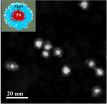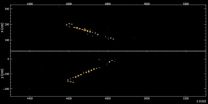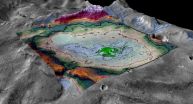New test measures effectiveness of treatments for Huntington's disease
2015-08-07
(Press-News.org) A new test developed by UBC researchers allows physicians to measure the effects of gene silencing therapy in Huntington's disease and will support the first human clinical trial of a drug that targets the genetic cause of the disease.
The gene silencing therapy being tested by UBC researchers aims to reduce the levels of a toxic protein in the brain that causes Huntington's disease.
The test was developed by Amber Southwell, Michael Hayden, and Blair Leavitt of UBC's Centre for Molecular Medicine and Therapeutics and the Centre for Huntington Disease in collaboration with colleagues from Mayo Clinic. It was recently featured in a study published in Scientific Reports.
"This is an important breakthrough for several promising gene silencing therapies in Huntington's disease that are now moving from the bench to the bedside," said Leavitt. "We can move forward with these clinical trials and accurately measure whether our treatments are working."
Huntington's disease is a genetic disorder but symptoms generally don't appear until later in life. It affects the brain and gradually worsens, causing problems with coordination and movement, mental decline and psychiatric issues.
The genetic mutation responsible for Huntington's produces a toxic form of a protein called huntingtin, which progressively injures brain cells. Reducing brain levels of this toxic protein should prevent or delay the onset of symptoms. Several huntingtin-lowering therapies have already shown great promise in animal models of Huntington's disease and are rapidly approaching trials in humans.
The UBC research team found that they could accurately measure the levels of mutant huntingtin protein in the brain by collecting cerebrospinal fluid from a spinal tap. The ultrasensitive test detects small amounts of the toxic protein and can be used to follow changes in brain levels of the protein over time in response to new therapies.
This study enables Leavitt to initiate a new clinical trial of a huntingtin gene-silencing therapy for patients at the Centre for Huntington Disease at the Djavad Mowafaghian Centre for Brain Health, a partnership between UBC and Vancouver Coastal Health. This trial will test the safety of a novel gene-silencing treatment in patients and is already in the process of screening patient candidates. The trial will be the first human study of a drug targeting mutant huntingtin.
INFORMATION:
ELSE PRESS RELEASES FROM THIS DATE:
2015-08-07
This news release is available in Japanese.
There are no magic bullets for global energy needs. But fuel cells in which electrical energy is harnessed directly from live, self-sustaining chemical reactions promise cheaper alternatives to fossil fuels.
To facilitate faster energy conversion in these cells, scientists disperse nanoparticles made from special metals called 'noble' metals, for example gold, silver and platinum along the surface of an electrode. These metals are not as chemically responsive as other metals at the macroscale but their atoms become more ...
2015-08-07
Scientists searched the chromosomes of more than 4,000 Huntington's disease patients and found that DNA repair genes may determine when the neurological symptoms begin. Partially funded by the National Institutes of Health, the results may provide a guide for discovering new treatments for Huntington's disease and a roadmap for studying other neurological disorders.
"Our hope is to find ways that we can slow or delay the onset of Huntington's devastating symptoms," said James Gusella, Ph.D., director of the Center for Human Genetic Research at Massachusetts General ...
2015-08-07
Scientists on the NOvA experiment saw their first evidence of oscillating neutrinos, confirming that the extraordinary detector built for the project not only functions as planned but is also making great progress toward its goal of a major leap in our understanding of these ghostly particles.
NOvA is on a quest to learn more about the abundant yet mysterious particles called neutrinos, which flit through ordinary matter as though it weren't there. The first NOvA results, released this week at the American Physical Society's Division of Particles and Fields conference ...
2015-08-07
WORCESTER, MA -- Researchers at the University of Massachusetts Medical School have found that Google Glass, a head-mounted streaming audio/video device, may be used to effectively extend bed-side toxicology consults to distant health care facilities such as community and rural hospitals to diagnose and manage poisoned patients. Published in the Journal of Medical Toxicology, the study also showed preliminary data that suggests the hands-free device helps physicians in diagnosing specific poisonings and can enhance patient care.
"In the present era of value-based care, ...
2015-08-07
Health care organizations have been implementing health information technology at increasing rates in an effort to engage patients and caregivers improve patient satisfaction, and favorably impact outcomes. A new study led by researchers at Brigham and Women's Hospital (BWH) finds that a novel web-based, patient-centered toolkit (PCTK) used by patients and/or their healthcare proxys in the hospital setting helped them to engage in understanding and developing their plan of care, and has the potential to improve communication with providers. The results of the study are ...
2015-08-07
Australian scientists have discovered many tropical, mountaintop plants won't survive global warming, even under the best-case climate scenario.
James Cook University and Australian Tropical Herbarium researchers say their climate change modelling of mountaintop plants in the tropics has produced an "alarming" finding.
They found many of the species they studied will likely not be able to survive in their current locations past 2080 as their high-altitude climate changes.
The Wet Tropics World Heritage Area in Queensland, Australia is predicted to almost completely ...
2015-08-07
A James Cook University study shows fish retreating to deeper water to escape the heat, a finding that throws light on what to expect if predictions of ocean warming come to pass.
JCU scientists tagged 60 redthroat emperor fish at Heron Island in the southern Great Barrier Reef. The fish were equipped with transmitters that identified them individually and signaled their depth to an array of receivers around the island.
The experiment monitored fish for up to a year and found the fish were less likely to be found on the reef slope on warmer days. Scientists think ...
2015-08-07
Mars turned cold and dry long ago, but researchers at the University of Colorado Boulder have discovered evidence of an ancient lake that likely represents some of the last potentially habitable surface water ever to exist on the Red Planet.
The study, published Thursday in the journal Geology, examined an 18-square-mile chloride salt deposit (roughly the size of the city of Boulder) in the planet's Meridiani region near the Mars Opportunity rover's landing site. As seen on Earth in locations such as Utah's Bonneville Salt Flats, large-scale salt deposits are considered ...
2015-08-07
Ruxolitinib (trade name: Jakavi) has been approved since March 2015 for the treatment of adults with polycythaemia vera, a rare disease of the bone marrow. It can be used when the drug hydroxyurea is ineffective or not tolerated. The German Institute for Quality and Efficiency in Health Care (IQWiG) examined in a dossier assessment whether this drug offers an added benefit over the appropriate comparator therapy.
According to the findings, ruxolitinib offers better relief of individual symptoms and improves quality of life. Dyspnoea and muscle cramps are more frequent, ...
2015-08-07
Brussels, [7 August 2015] - An unresolved inflammatory response is likely to be involved from the early stages of disease development. Controlling inflammation is crucial to human health and a key future preventative and therapeutic target. In a recent ILSI Europe's article published in the British Journal of Nutrition, a coalition of experts explain how nutrition influences inflammatory processes and help reduce chronic diseases risk.
Inflammation is a normal component of host defence, but elevated unresolved chronic inflammation is a core perturbation in a range of ...
LAST 30 PRESS RELEASES:
[Press-News.org] New test measures effectiveness of treatments for Huntington's disease




